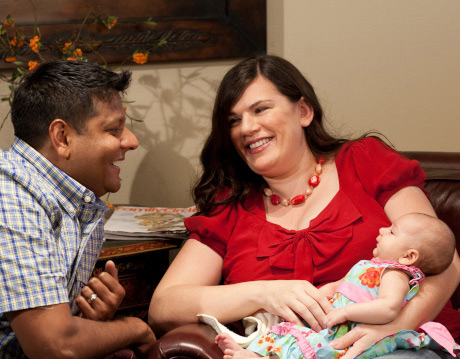Are you wondering whether you are pregnant? Missing your period is often the first clue that a woman might be pregnant.
However, there are many other early symptoms that might signal you to take an at-home pregnancy test. Some of these include:
- Missed or light period
- Tender breasts
- Morning sickness or feeling nauseous throughout the day
- Heightened sense of smell
- Dizziness and/or headaches
- Exhaustion or fatigue
The sooner you find out about a pregnancy, the better. If you have early pregnancy symptoms and you get a positive home pregnancy test, call UNM Health at 505-272-2245 to schedule an appointment.
At the hospital, we’ll give you an advanced pregnancy test and an ultrasound exam—the only way to know for sure if you are pregnant. If you are, we will help you with options, including setting up prenatal care—health care during pregnancy.
Let’s discuss common early pregnancy symptoms and what to do if you have them.
1. Missed or Light Period
“I’m late.” Many women are familiar with that phrase. A missed period is one of the first early signs of pregnancy. However, many women have irregular periods, which means being late is not always a reliable sign.
For women with consistent cycles, missing a period is a good way to know when it is time to take a home pregnancy test.
One way to determine if you are having regular periods is to start tracking your cycles on a phone app or calendar. The first day of your period is the first day you begin to have vaginal bleeding or spotting.
At your prenatal care visit, your provider will ask you about your “last menstrual period” or the first day of your last cycle. It is helpful to keep track of your cycles in order to determine an accurate due date.
What to do: Buy an over-the-counter pregnancy test. There are different types of tests available: line, digital, and strip. Choose based on your preference and check the package date to make sure it is not expired.
Home pregnancy tests detect the hormone hCG in your urine. Results are most accurate if you wait until the week after your missed period. Read all directions on the box before you take your test. Try to take your test first thing in the morning, when your urine is most concentrated. If your test is positive, call 505-272-2245 to schedule an appointment.
2. Tender Breasts
There are many reasons your breasts could be tender—too much caffeine or alcohol, a hard workout, normal period-related swelling. Many women also have sore breasts in early pregnancy. Sometimes, the breasts will look or feel heavier. This change is because progesterone and estrogen levels rise very early in a pregnancy. Increased hormones commonly make the nipples extra sensitive and the skin around them look darker.
What to do: If this symptom comes out of the blue and lasts for more than a few days, you may want to take a home pregnancy test—especially if you also have any of the other symptoms in this list. If you are having pain in your breasts, you can use a heating pad or ice packs as needed to help with the pain. It is safe to take Tylenol as well for pain control but avoid taking ibuprofen or other NSAIDs.
3. Morning Sickness
If you are sitting at home or work and suddenly feel nauseous, it could be the stomach flu or food poisoning. However, if you can’t track that queasy feeling back to a meal or illness, morning sickness might be the culprit.
“Morning” sickness is very common in pregnancy, and it does not happen only in the morning. Unfortunately, waves of nausea can strike suddenly in the morning, afternoon, or evening.
What to do: Simple things you can do at home might help curb that yucky feeling:
- Eat a peppermint.
- Snack on crackers.
- Chew mint gum.
- Drink cold water.
- Try ginger tea or ginger chews
- Sit down and take deep breaths.
Most patients stop having morning sickness by the second trimester (12-14 weeks of pregnancy), and most patients don’t need medical care for it.
If you are vomiting several times a day, call a doctor or midwife. Approximately 3% of patients will get hyperemesis gravidarum—a rare but very bad form of nausea and vomiting in pregnancy

Expecting Unexpectedly?
You have options.4. Heightened Sense of Smell
Imagine you open a jar of peanut butter to spread on your morning toast. Suddenly, the smell bombards you. Strong reactions to smells that didn’t previously affect you can be an early sign of pregnancy.
There is not an exact medical reason why, but many women report a heightened sense of smell when pregnant. Sometimes, smells can trigger morning sickness.
What to do: Try sipping some ginger ale or snacking on a few saltines. These tricks can settle your stomach when you can’t avoid a strong odor.
5. Dizziness and Headaches
During pregnancy, changes in hormone levels and blood circulation can cause mild dizziness and minor headaches. These changes can cause dehydration.
What to do: Drink plenty of water to ease dizziness and headaches. Aim for eight cups of water a day. It is also safe for most patients to take acetaminophen (Tylenol) during pregnancy. Talk with your doctor or midwife about safe options for you.
If you have severe headaches or dizzy spells that don’t go away, call your doctor or midwife right away. These can be signs of a medical emergency like very high blood pressure (preeclampsia).
6. Feeling Very Tired
This common early pregnancy symptom is due to hormones and other rapid changes in your body. Some patients describe it as feeling exhausted, like they are wading through a heavy fog. If you can’t pinpoint a reason for feeling extra tired—like working too much, having trouble sleeping or feeling ill—you might be pregnant.
What to do: If you find out you are pregnant, try to take as many naps as you can. Eat a healthy diet consisting of plenty of protein, which can help ease morning sickness and give you energy.
Think You Might be Pregnant?
Every woman is different, and you may not have any of the symptoms on this list. That doesn’t mean there is something wrong with the pregnancy—you’re just lucky! Having these common early pregnancy symptoms does not necessarily mean you are pregnant. The only way to know for sure is to visit your doctor or midwife.
Whether a pregnancy is planned or unplanned, waiting to find out can be stressful. When you are ready to find out, you can get a free pregnancy test on a walk-in basis at the UNM Center for Family Planning and Reproductive Health.
If you are not pregnant, we can help you get access to birth control if you want it. If you are pregnant, we will discuss your options with you. We will not judge you—our top priority is helping you make the best health decision for you and your family.

